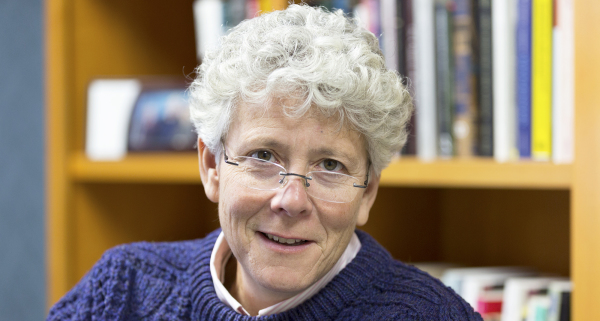The recent publication of Philosophy Professor Peg O’Connor in the New York Times blog, “The Learning Network,” is generating awareness and an opportunity to delve into the philosophy of addiction.
“I’ve been a philosophy professor for almost 20 years, and I have been in recovery for 27 years, but it’s really in the last maybe six years or so that the two pieces have intersected, come together, and it’s made me love philosophy more,” O’Connor said.
O’Connor’s piece, “In the Cave” was originally published online in 2012, but has most recently been utilized as part of the Learning Network Series “Text to Text” which pairs an article featured by the New York Times with another text or source to develop a lesson plan.
“What means a lot to me, is that ‘Text To Text’ on the Learning Network is all about teaching, and as a teacher, and as a teacher of philosophy, I’m always thrilled when philosophy is used and put into conversation with very relevant issues. It’s one way to make philosophy really compelling to students, and to get them to see how it matters and why it would be important for them,” O’Connor said.
O’Connor is currently working on manuscripts, and writes a blog for Philosophy Today. She also serves as a faculty member of the Chemical Health Advisory Task Force.
Athletics Director for Student Athlete Services and Assistant Director in Peer Education and Chemical Health Kari Eckheart noted O’Connor’s involvement in working with high risk students, and reflected upon the role of the Task Force.
“The goal is to have it be a broad group representing a variety of different places on campus. Peg has been that voice of the faculty. She’s been involved in chemical health for a long time here on campus, and so she brings a great perspective,” Eckheart said.
“Addiction is a big issue that needs to be examined. It’s something that’s very relevant and college campuses across the country are struggling with these things, not just Gustavus” —Scott Bur
Eckheart also noted that the Task Force recognizes the need to focus on the whole spectrum of chemical use on campus, addressing non-drinkers, those who choose to drink in a healthy way, and the higher risk students.
“I think it’s healthy for us to look at the entire spectrum instead of just focusing on one area. If we just focused on addiction I think we’d be missing out on part of what our campus offers, but if we don’t offer addiction too, on the other hand, I think we again are missing out on what our campus needs to be focusing on,” Eckheart said.
O’Connor is involved with shaping next year’s Nobel Conference, entitled “Addiction: The Science and Meaning of an Equal Opportunity Condition.”
Chemistry Professor and Director of the Nobel Conference Scott Bur spoke about O’Connor’s role.
“It’s been interesting, because as a natural scientist, I have a particular view of what the Nobel Conference is, and what the mission of it is. She’s really pushed me to bring it down to a level where the people are going to be engaged, not just interested in something. And that’s going to make it a little bit of a unique conference. She has challenged us to figure out how to make this really have an impact on a college campus in particular,” Bur said.
“I see wonderful teaching opportunities with this Nobel Conference, and what a wonderful way to connect with student life and our drug and alcohol education and prevention programs.”—Peg O’Connor
Bur said that O’Connor’s piece by the New York Times also reflects the relevance and importance of the study of addiction. Addressing other forms of addiction, Bur noted the importance of the topic in a college setting.
“It’s a big issue that needs to be examined. It’s something that’s very relevant and college campuses across the country are struggling with these things, not just Gustavus,” Bur said.
O’Connor also addressed the importance of the topic for high school and middle school students as chemical use has been starting at younger ages. Her published writing and work on campus has served to educate those at Gustavus, as well as the larger community.
“We’re a college campus, and actually this is one of the times where addiction, if it hasn’t already taken hold, can take hold. So coming back to my role as a teacher, I see wonderful teaching opportunities with this Nobel Conference, and what a wonderful way to connect with student life and our drug and alcohol education and prevention programs,” O’Connor said.
-Libby Larson
